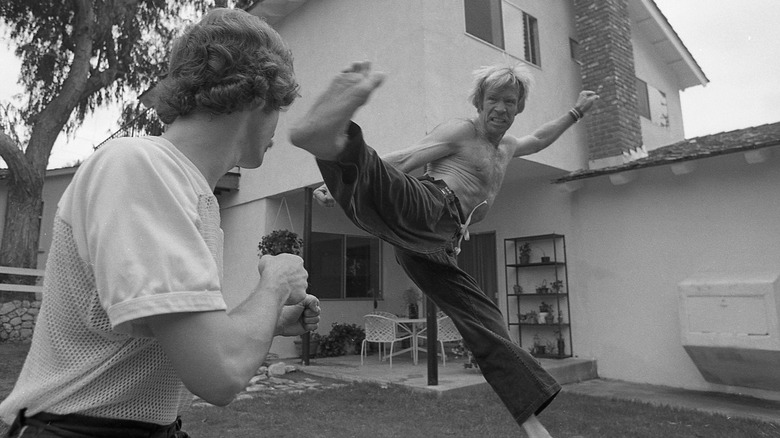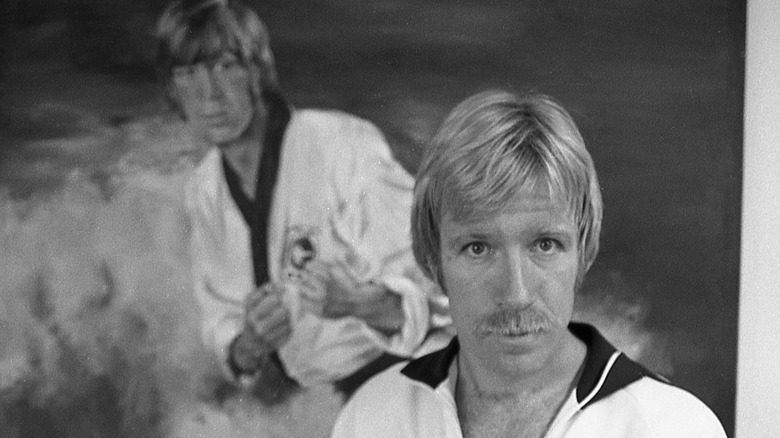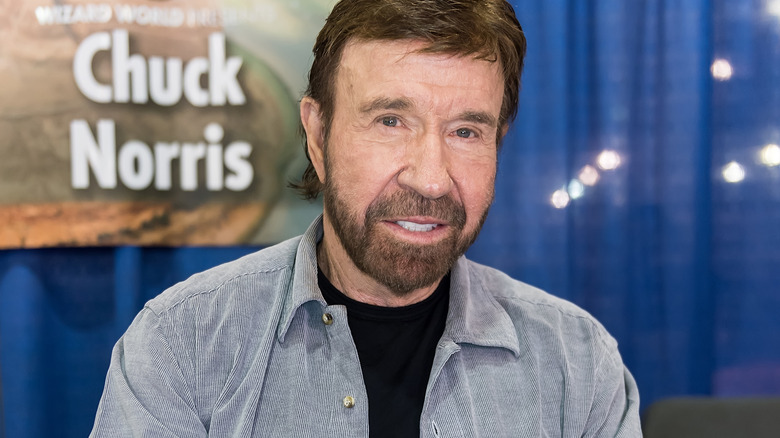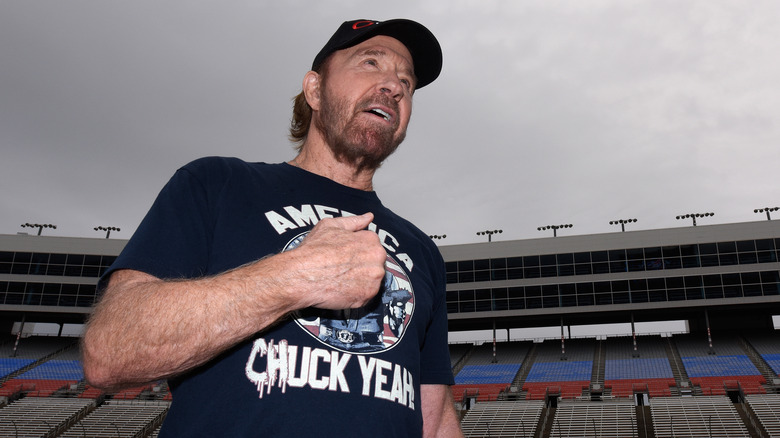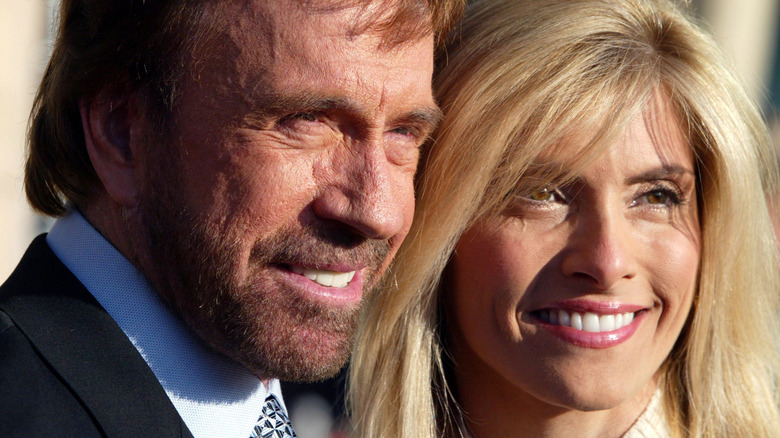Tragic Stories About Chuck Norris
We may receive a commission on purchases made from links.
Chuck Norris's tears cure cancer, the joke starts. It's too bad he's never cried. Hilarious, right? Everyone has heard those over-the-top Chuck Norris jokes that really give no choice but to chuckle along with at least a few of them. It's probably the Chuck Norris vibes.
But Norris is just as human as the next person — so, at least, the available evidence suggests — and that means he's gone through ups and downs. And, according to an interview he did with Black Belt, he does cry: He apparently cried at the episode of "Walker: Texas Ranger" that featured a very young Haley Joel Osment as a boy with AIDS. Also important to him? The episodes that dip into spirituality, and by spirituality, he definitely means Christianity.
Read through any of his copious writings, and it's clear that he relies on his faith for a lot. It's allowed him to get through some pretty dark times, and that means that what us mere mortals might consider a tragedy, for him, he doesn't necessarily see it that way. Take the story of Michael Majia, a 5-year-old boy Norris met through Make-A-Wish. He died of leukemia a few years after Norris met him, and tragic? Absolutely: But Norris looked at it a different way. In his autobiography, "Against All Odds: My Story," he wrote that Majia's death inspired him to be a better person, commit fully to his faith, and continue to work with Make-A-Wish. Tragedy can turn to inspiration, so what has Norris struggled with?
The following article includes allegations of domestic abuse and addiction.
He grew up in the shadow of his war veteran, alcoholic father
Just a few months after Chuck Norris's younger brother, Wieland, was born, their father was drafted into WWII. In his memoir, "Against All Odds: My Story," Norris recounted his family getting one of the worst messages imaginable: Ray Norris was MIA. When he ultimately returned to the family, his time in the war weighed heavily on him, and his alcohol addiction grew worse.
Norris recalled some harrowing incidents, writing about his father threatening his mother, trying to get her to give him the five dollars she'd put aside for food. "When he was drunk, little things often sent him into a rage. If he heard the water running while he was suffering from a hangover, he would explode in an abusive tirade, roaring threats and expletives ... While Mom tried to calm him down, Wieland and I hid in the bedroom," he wrote.
He reflected on the role models he had growing up, saying that they were the cowboys he saw on the big screen ... on the days when he had an extra dime and could afford to go there, that is. Even as he lauded his mother for her strength, he also wrote about how trying it was to grow up with a father caught in a vicious cycle of drinking, abuse, and apologies never followed through on: "My father was a negative role model, the kinds of person I didn't want to be, a bad example to be avoided."
If you or anyone you know needs help with addiction issues, help is available. Visit the Substance Abuse and Mental Health Services Administration website or contact SAMHSA's National Helpline at 1-800-662-HELP (4357).
He learned the hard way that his father wasn't going to change
In his memoir, "Against All Odds: My Story," Chuck Norris wrote about his eternal hope that one day the drinking would stop, but he also wrote about realizing that wasn't going to happen, and the knowledge they had seen earlier how things had the potential to go. He wrote that they had moved from Arizona to Oklahoma and one night, his father — drunk — decided that they were going back to Arizona, piled everyone in the car, and started driving.
"In his inebriated condition, Dad weaved all over the road as he tried to drive. Mom was crying hysterically, begging him to stop before he killed us all or someone else," Norris wrote.
And it took years, but it did happen: Not long after the birth of Norris's youngest brother, Aaron, their father was driving drunk when he hit and killed a woman. Convicted and sentenced to a work camp, they visited him regularly. Norris recalled being hopeful that it would encourage him to stay sober, but that hope was short-lived. After he was released, Norris wrote that he went right for the bar: "Dad was becoming increasingly aggressive at home and abusive toward Mom," he wrote, sharing that at one point, he intervened. After he hit her, Norris stepped between them, armed with a hammer. "Luckily, he was too drunk to take my threat too seriously." That, he said, was when they realized they had no choice but to leave for good.
If you or someone you know is dealing with domestic abuse, you can call the National Domestic Violence Hotline at 1−800−799−7233. You can also find more information, resources, and support at their website.
He was devastated by his brother's death in Vietnam
Chuck Norris is famously patriotic: He's so patriotic, in fact, that he wrote "Black Belt Patriotism: How to Reawaken America" as a sort of blueprint of how to fix all that he saw wrong with the country. He hasn't always had such an unconditionally devoted attitude toward the country, though, and when he appeared on "The Dick Cavett Show," he shared the heartbreaking story of how his brother Wieland was killed during the Vietnam War.
He had been acting as the point man on a patrol when he realized they were walking into a Viet Cong ambush, and he tried to warn the rest of his unit. He was shot and killed. Norris went on to say that they'd found out what happened from one of the other soldiers who had been there: He attended Wieland's funeral, and made sure that his family knew that he had given his life to warn his fellow soldiers of immediate danger.
When Cavett asked if the loss was made worse by the loss of the war, Norris explained that when the U.S. first got involved, he was 100% behind it. "I'm one of these ultra-patriotic type guys," he explained. "But reflecting back, ... realizing what kind of a war it was, it was a war of monetary gains, rather than a war of principle. ... I think it was a war that could not be won ... and we have to be careful about that in the future."
He carried major guilt over an affair and a daughter he didn't know about
Chuck Norris's first marriage ended in divorce, and he wrote in his memoir, "Against All Odds: My Story," that he was absolutely devastated. "Divorce was a shock to my system," he wrote. "Besides the emotional issues of dealing with a sense of failure, I was suddenly thrown into a whole new lifestyle ... All my life I had been accustomed to being taken care of and nurtured by strong, wonderful women."
His entire life changed when he got a letter in the mail from Dianna DeCioli, and she was writing to tell him that she was his daughter. Her mother, Johanna, had a short-term fling with the then-married Norris when he was in the military ... and Norris stresses that he never actually told her that he was married. She later discouraged her daughter from reaching out to him — saying it would ruin his marriage — but with the news of his divorce, she reached out.
Norris said that he knew he was her father as soon as he saw her, and that he struggled with what he'd done: His faith had taught that extramarital affairs were a definite sin, and not only did he feel the weight of the sin, but also guilt over not being there for his daughter and her mother. He recalled asking Johanna for her forgiveness, and said even though he ultimately went on to recognize his extended family as a blessing, he continued to regret all those lost years.
Lee Atwater's death hit him very, very hard
According to what Norris wrote in his memoir, "Against All Odds: My Story," Lee Atwater had recognized him as not only a conservative Republican, but someone who could give Bush a little bit of a tough-guy image. Norris ended up making scores of appearances in support of Bush, and wrote that along the way, he and Atwater developed an earnest friendship.
Atwater had been in politics for a long time by then — he made a name for himself when he helped secure a presidential nomination for Ronald Reagan years earlier. When he passed away in 1991, he was just 40 years old: He had collapsed while giving a speech, was diagnosed with an inoperable brain tumor, and died shortly afterward.
In the weeks before his death, Atwater was hospitalized — his appearance drastically changed by the toll his illness was taking. Norris wrote that he was one of a handful of people allowed to visit him, and when he did, he couldn't speak above a whisper. "I kissed him on the forehead and I quickly left his hospital room, desperately struggling to hold back tears," Norris wrote. "I made it as far as the car before I burst out crying; I sat behind the wheel and just wept and wept." He wrote that Atwater's death had hit him hard: "It hit me that if a person such as Lee ... could be decimated so quickly, perhaps I was not invincible, either."
His wife suffered a devastating illness
By 2017, Chuck Norris's fans were beginning to notice that he had sort of stepped away from the limelight — and according to a statement he gave to The Washington Post, there was a heartbreaking reason for his absence. "Over the past several years, my focus has been on [his wife] Gena's health. And now we are working together to speak out about the dangers of MRI contrast agents."
Gena O'Kelley had undergone an MRI scan as a test for the possibility she would develop rheumatoid arthritis, and after the test, she experienced a laundry list of symptoms that included tremors, numbness, and difficulties putting thoughts and words together. In an interview with CBS, they said she found herself in the emergency room multiple times, in the hospital for months, and accumulated bills to the tune of $2 million. That included treatments to repair her central nervous system, and trips to China for stem cell therapies.
Norris recalled the fear: "There's nothing going on here, she's dying, she's dying right in front of me here." He continued that it wasn't just about her, and that it was about the others who had been diagnosed with illnesses connected with gadolinium deposition disease. They initially filed a $10 million lawsuit against the companies manufacturing the dye that was blamed for her illness, but the lawsuit was voluntarily withdrawn, and no settlement was arranged.

